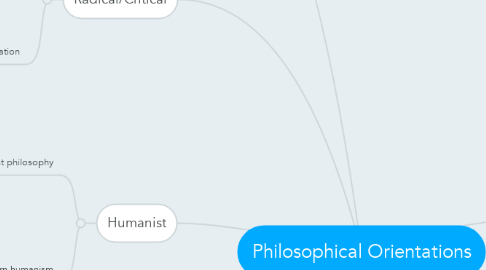
1. Progressive
1.1. Science authority approach
1.1.1. Darwin's theory of evolution
1.1.2. Experimental and Problem solving.
1.1.2.1. Rousseau
1.1.2.1.1. Human curiosity should be tapped in the learning process
1.1.2.2. John Dewey
1.1.2.2.1. Scientific and social literacy were necessary components
1.1.2.3. Elias/Merriam
1.1.2.3.1. Progressivism had a larger impact on North America's adult education
2. Behaviorist
2.1. Classical Conditioning (key concept)
2.1.1. Inner behaviourism
2.1.1.1. Cognitive psychology
2.1.1.2. Replaced outer behaviourism
2.1.2. Outer behaviourism
2.1.2.1. Largely based on animal experiments.
2.1.2.2. Critiqued by humanists (unethical claims)
3. Humanist
3.1. Humanist philosophy
3.1.1. freedom
3.1.2. dignity
3.1.3. autonomy
3.2. Modern humanism
3.2.1. Maslow and Rodgers
3.2.1.1. Person centred
3.2.1.2. Caring
3.2.2. Against industrial revolution
3.2.2.1. Self actualization
3.2.2.1.1. freedom
3.2.2.1.2. optomism
4. Radical/Critical
4.1. Building on humanism
4.1.1. Develops when people understand their societal position
4.1.2. Challenges injustice
4.1.2.1. optomism
4.1.2.2. freedom
4.2. Education
4.2.1. Political
4.2.2. Freire (1970)
4.2.2.1. Liberation
5. Postmodernism
5.1. Derek Briton (1996)
5.1.1. Reaction
5.1.1.1. Neoconservative
5.1.1.1.1. Responsibility
5.1.1.1.2. Self discipline
5.1.1.1.3. Social order
5.1.1.1.4. Obedience
5.1.2. Resistance
5.1.2.1. Resist opression
5.1.2.2. Feminist movement
5.1.3. Engagement
5.1.3.1. Ethical thinking assistance
6. Liberal
6.1. Platos
6.2. Aristotle
6.2.1. Practical
6.2.1.1. Applying knowledge to daily problems.
6.2.2. Theoretical
6.2.2.1. Contemplation of the deepest principles and truths.
6.3. Socrates
6.3.1. Question all assumptions and the existing order of things in search for wisdom and a virtuous life.
6.4. Paterson
6.4.1. "The commitment of education is always and necessarily to the truth, wherever it may lead." (p. 198)
